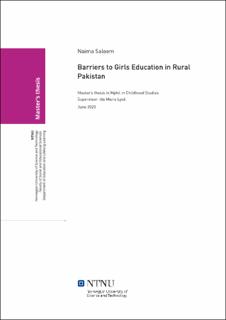| dc.description.abstract | The purpose of this research is to explore the known factor of gender discrimination along
with other barriers that create hindrance in acquiring education for rural girls of Pakistan.
This study highlights the prevalent familial, cultural, and societal perceptions regarding
the education of teenage girls, narrated by the young girls themselves, their mothers, and
few grandmothers.
This study is interesting because it has included the voice of females. As a patriarchal
society, a rural female commonly does not get a chance to express her thoughts and
feelings openly, thus they are left in shadow. This research has given voice to them by
explicitly focusing adolescent girls in rural areas, who are rarely included in research. The
young girls not only opened up about the difficulties they face for acquiring education, but
also the crucial role their gender plays in the construction of their childhood period and in
their everyday lives.
Qualitative research methodology in the form of interviews and observation was used for
the collection of data. The participants were randomly selected from two rural areas of
Pakistan. The findings from the interviews were presented and analyzed using theoretical
approaches from Childhood Studies; social constructionist and actor-oriented approach.
The concept of gender has also been used for examining the cultural practices and values.
The findings suggest that a number of factors are not only involved in creating difficulties
in seeking education but also are responsible for the way girlhood is constructed in rural
areas. Purdah (veiling), izzat (honor or respectability) and poverty were prominent reasons
behind gender discrimination. Gender discrimination was found to be deeply rooted in rural
society in all aspects of life. Before addressing the issue of gender disparity in education,
on a global level, there is need to understand its local dimensions first. | |
